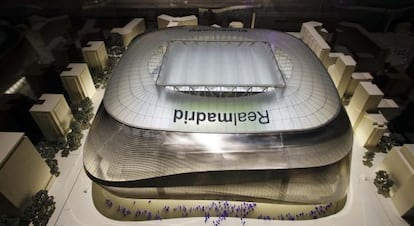Court rules against Real Madrid’s stadium expansion plans
Decision puts project to add shopping mall and hotel to Santiago Bernabéu on hold

Madrid’s regional High Court has ruled against an ambitious plan to expand Real Madrid’s Santiago Bernabéu soccer stadium that had already been approved by City Hall, after deciding it would violate local zoning laws.
The decision handed down Tuesday by a panel of judges from the chamber for judicial review of administrative acts puts on hold club president Florentino Pérez’s proposals to construct a shopping mall and hotel complex at the stadium. A copy of the ruling has been obtained by EL PAÍS.
City Hall and the Madrid regional government, both controlled by the Popular Party (PP), had approved the plans on November 15, 2012. Under the deal, which involved a complex series of land transactions between Real Madrid and the local governments, a shopping center and hotel would be built at the front of the Bernabéu facing the Paseo de la Castellana, while a new roof would include space for a potential sponsor to attach its name to the complex.
City Hall approved the plan, which involves a complex series of land transactions, in 2012
But the judges’ panel ruled that the proposal violated zoning laws as well as the General Urban Development Plan for Madrid because the land transactions agreed by the city and the soccer club included plots located more than seven kilometers apart – in the central Paseo de la Castellana and outlying Carabanchel district – that had no relation to one another.
For example, the court ruled that the land plots in Carabanchel were expropriated by the city in order to build social housing – something that City Hall had “overlooked” when it turned them over to Real Madrid in 2011.
The history of these transactions goes back to 1991, when Real Madrid reached an agreement with the city to build a parking area next to the stadium. The project was never completed and the soccer club ended up owing the city around €2.8 million.
In 1998, the club signed a pact with the city for an exchange of land in which it would hand over the team’s training ground, Ciudad Deportiva (appraised at €13.5 million), in return for four plots in Julián Camarillo district (worth €13 million) and another in Las Tablas (worth €488,000), in the north of the city.
However, the transfer of the Las Tablas plot to Real never took place after the land was determined to be public. The city and the team signed an agreement on July 29, 2011 to tie up the loose ends on the deals, but by then the Las Tablas land had been reappraised to be worth €22.7 million.
To compensate for the rise in value, the city gave the club four other plots of land on Mercedes Arteaga street (appraised at €4.4 million); an estate in Valdebebas (€8.7 million); and a three-meter-wide strip around the stadium where the structure’s pillars and buttresses stand (€6.9 million).
The outstanding €2.8 million corresponds to the amount the club owed to the city for the parking lot that was never built in 1991.
In 2012, Madrid City Hall approved modifications to the urban development plan that also allowed the club to build a roof over the stadium, a 12,250-square meter shopping mall, and a 600-space parking garage.
In turn, Real Madrid pledged to convert the La Esquina shopping mall, located between Concha Espina and Padre Damián streets, into a public park, and give four plots of land on Mercedes Arteaga to the city. The club also agreed to pay €6.6 million in cash.
The EC is also reportedly looking into whether state aid is being used to help remodel the Bernabéu
A complaint against the proposal was filed in court by environmental group Ecologists in Action in 2012. Last August, the court ordered an injunction until it could issue a ruling.
The European Commission is also reportedly conducting an investigation to see whether state aid is being used to help remodel the Bernabéu, in violation of European law.
In its ruling, the Madrid High Court said there was a “fictitious link” between the plots of land and the aims outlined in the urban development plan. “There is no public benefit,” the court stated.
The city has not commented on the ruling.
In a statement Real Madrid said it would “work with the City Council and the Madrid regional government to address those aspects that require attention in order to make the Santiago Bernabéu remodeling project viable.”
Tu suscripción se está usando en otro dispositivo
¿Quieres añadir otro usuario a tu suscripción?
Si continúas leyendo en este dispositivo, no se podrá leer en el otro.
FlechaTu suscripción se está usando en otro dispositivo y solo puedes acceder a EL PAÍS desde un dispositivo a la vez.
Si quieres compartir tu cuenta, cambia tu suscripción a la modalidad Premium, así podrás añadir otro usuario. Cada uno accederá con su propia cuenta de email, lo que os permitirá personalizar vuestra experiencia en EL PAÍS.
¿Tienes una suscripción de empresa? Accede aquí para contratar más cuentas.
En el caso de no saber quién está usando tu cuenta, te recomendamos cambiar tu contraseña aquí.
Si decides continuar compartiendo tu cuenta, este mensaje se mostrará en tu dispositivo y en el de la otra persona que está usando tu cuenta de forma indefinida, afectando a tu experiencia de lectura. Puedes consultar aquí los términos y condiciones de la suscripción digital.








































